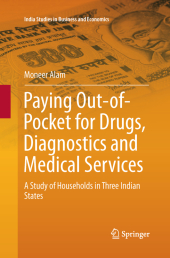 Neuerscheinungen 2015Stand: 2020-02-01 |
Schnellsuche
ISBN/Stichwort/Autor
|
Herderstraße 10
10625 Berlin
Tel.: 030 315 714 16
Fax 030 315 714 14
info@buchspektrum.de |

Moneer Alam
Paying Out-of-Pocket for Drugs, Diagnostics and Medical Services
A Study of Households in Three Indian States
2013. 2015. xlix, 152 S. 58 Tabellen. 235 mm
Verlag/Jahr: SPRINGER, BERLIN; SPRINGER INDIA; SPRINGER 2015
ISBN: 8132217357 (8132217357)
Neue ISBN: 978-8132217350 (9788132217350)
Preis und Lieferzeit: Bitte klicken
_
In India there is a high incidence of morbidity and malnutrition coupled with low standards of public health and expensive medical care. Despite several policy initiatives and many attempts to promote a healthy society, health remains an issue of concern. Policy-makers recognise that the country suffers unacceptably high levels of disease and premature death. A 2005 report from the National Commission on Macroeconomics and Health (NCMH) claims that private out-of-pocket (OOP) health expenditure often has a catastrophic effect on the consumption of basic goods and services for low-income households, forcing many below the poverty line and often blocking private intergenerational flows, severely affecting family members including the co-residing elderly, especially women. As poverty, malnutrition and enormous disparities are widespread, particularly in rural areas and urban slums, reliance on private health providers is fraught with serious economic consequences. Disease prevalence among these groups is particularly high. The market plays an increasingly important role in delivering health and diagnostic services. Infrastructural bottlenecks faced by central, state and local government health services force public health service users to access private medical care and incur very high out-of-pocket (OOP) expenses. All these issues are in direct contradiction to India´s National Population Policy (2000) and National Health Policy (2002).
This book highlights some of these neglected issues, and focuses largely on private expenditure on drugs and medicines for the treatment of ailments both with and without hospitalisation. It examines private OOP health expenditures in rural and urban households after breaking them down into the various healthcare service components including drugs and medicines (which constitute about 75 to 80 percent of OOP health expenditure), and assesses the extent of capital sample households borrow to finance medical expenditure and the effect on their basic food and non-food consumption requirements.
Chapter 1: Introduction.- Chapter 2: Population Size and Composition of Sample Households.- Chapter 3: Socio-economic Variations, Consumption Poverty and Health Generated Inequalities in Sample Population.- Chapter 4: Self-reported Ailments and Hospitalization: Differentials in Utilization of Health Care.- Chapter 5: Catastrophic Spending on Health by sample Households: Some Results.- Chapter 6: Decomposing Out-of-Pocket Health Spending: Share of Drugs, Medical Services and Other components.- Chapter 7: Utilization of Public Health Facilities: A Situational Assessment.- Chapter 8: Broad Conclusions and Policy Directions.
"In this monograph, Moneer Alam summarizes results of an interesting survey on the distribution of out-of-pocket costs for medical care in India. The survey covered 2,100 households in a pair of ´typical´ districts in two rural states and in several neighborhoods in Delhi." (David I. Levine, Journal of Economic Literature, June, 2015)
"The book is organized into eight chapters with an excellent overview on the scope of the study and its important findings. ... This book is a timely and valuable addition to the relatively less explored issues concerning paying out-of-pocket for health care in Indian context. Author needs to be complimented for providing a comprehensive analysis on this complex theme and for highlighting critical policy issues and broad policy directions." (Dr. T. V. Sekher, Demography India, Vol. 42 (1-2), 2013)


